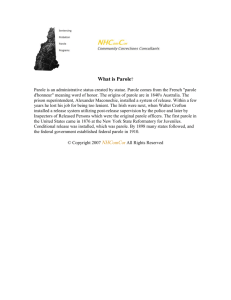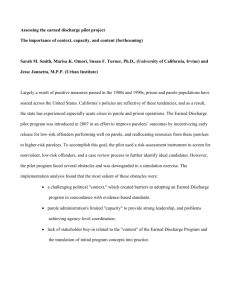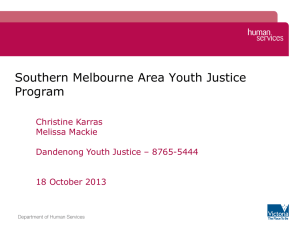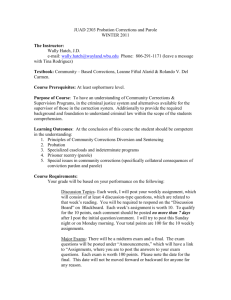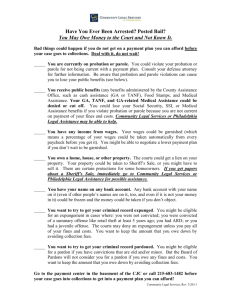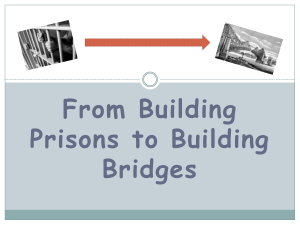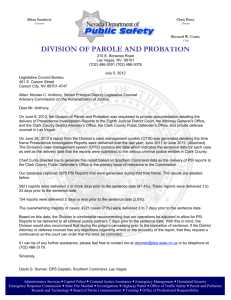Update On Parole And The State Parole Authority
advertisement
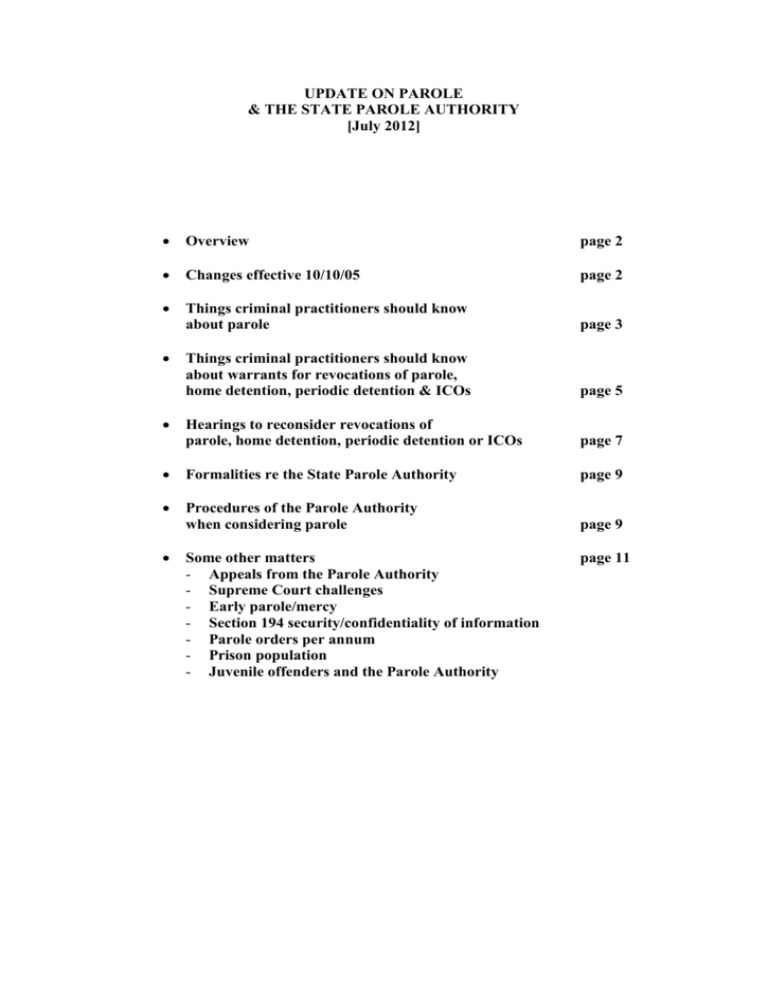
UPDATE ON PAROLE & THE STATE PAROLE AUTHORITY [July 2012] Overview page 2 Changes effective 10/10/05 page 2 Things criminal practitioners should know about parole page 3 Things criminal practitioners should know about warrants for revocations of parole, home detention, periodic detention & ICOs page 5 Hearings to reconsider revocations of parole, home detention, periodic detention or ICOs page 7 Formalities re the State Parole Authority page 9 Procedures of the Parole Authority when considering parole page 9 Some other matters - Appeals from the Parole Authority - Supreme Court challenges - Early parole/mercy - Section 194 security/confidentiality of information - Parole orders per annum - Prison population - Juvenile offenders and the Parole Authority page 11 2 UPDATE ON PAROLE & THE STATE PAROLE AUTHORITY [July 2012] Overview 1. The State Parole Authority (commonly called 'SPA') has jurisdiction in relation to granting parole, revoking parole and revoking sentences of home detention, periodic detention and intensive correction orders. 2. The applicable legislation is: Crimes (Administration of Sentences) Act 1999, Part 6 (ss125-161), Part 7 (ss162-182) and Part 8 (ss183-194); and, Crimes (Administration of Sentences)Regulation 2008, Chapter 7 (cls 224241A) and Chapter 8 (cls 242-249). 3. There were significant legislative amendments effective from 10/10/05 which were the most drastic (and harsh) changes to parole in the last few decades. Details are discussed below. 4. Since 1 April 2008, the hearings of the Parole Authority are at Parramatta in court 7 of the Sydney West Trial Courts complex. The office of the Parole Authority is in the Parramatta Justice Precinct Offices - contact numbers for the Authority are ph 8688 3629 and fx 8688 3699. 5. Legal Aid NSW’s, Prisoners Legal Service (PLS) provides a duty in-house solicitor service at hearings before the Authority. PLS is also located in the Parramatta Justice Precinct Offices - numbers for PLS are ph 8688 3888 and fx 8688 3895. 6. Lack of knowledge by practitioners and judges of the provisions relating to parole, combined with a view that it is the poor cousin of sentencing, leads to inadequate advice to clients and can cause serious delay in obtaining release to parole. Changes effective 10/10/05 7. The Crimes (Administration of Sentences) Amendment (Parole) Act 2004 commenced on 10/10/05 and substantially amended the principal legislation, the Crimes (Administration of Sentences) Act 1999. 8. The 'Parole Board' ceased to exist and was reconstituted as the State Parole Authority (s183). 9. There were significant changes to the criteria and procedure relating to parole consideration. Briefly, the major changes were: Section 128(2A) was added, whereby, a parole order must include conditions giving effect to a post-release plan prepared by Probation and 3 Parole; and, s135A was added whereby the report prepared by Probation and Parole must address, the likelihood of the offender being able to adapt to normal lawful community life, risk of re-offending and the measures to be taken to reduce that risk, the offender’s attitude to the offence, the victim and willingness to participate in rehabilitation programs. Prior to the amendments, if parole was refused, a date could be fixed when parole would again be considered (eg. in 3 or 6 months). However, by the insertion of ss137A & 143A, this is no longer possible and, following refusal of parole there is a mandatory deferral of 12 months for further consideration. Prior to the amendments, a public hearing was available for all cases. By ss139(1) & 146(1), the Authority can refuse to have a hearing if not satisfied that a hearing is warranted. There is no appeal from a refusal to hold a hearing. Prior to the amendments, if parole was revoked a date could be fixed for consideration of re-parole (eg. in 3 or 6 months was common). This is no longer possible and, following revocation of parole there is a mandatory deferral of 12 months for parole consideration. As a result, many offenders serve the balance of their parole because they have less than 12 months left. The insertion of s141A permits the Commissioner of Corrective Services to make submissions concerning the release on parole of an offender. And, s172A allows the Commissioner to apply to a judicial member of the Parole Authority for an order suspending a parole order and issue a warrant. By s193A, the Minister is entitled to access to all documents held by the Parole Authority and, the victim of a serious offender is entitled to access to all documents except medical, psychiatric or psychological reports. Also, note the insertion of s2A (in 2008) into the Crimes (Administration of Sentences) Act which defines the objects of the Act. These include, the conflicting, “(a) to ensure that those offenders who are required to be held in custody are removed from the general community”, “(d) to provide for the rehabilitation of offenders with a view to their reintegration into the general community” and, “In pursuit of these objects, due regard must be had to the interests of victims of the offences”. Things criminal practitioners should know about parole 10. Who grants parole, the sentencing court or the Parole Authority? This is very fundamental but is surprisingly not as well known as you would expect. It is the length of the sentence which is the determining factor. If there are accumulated sentences, it is the length of the longest individual sentence which is the determining factor, not the aggregate of the sentences. The position is: Sentence of 3 years or less that has a non-parole period, the sentencing court must make an order directing release on parole at the end of the non-parole period (see ss50 & 51 Crimes (Sentencing Procedure) Act). This is commonly referred to as automatic parole but it is not always so. This is discussed in more detail below. 4 Sentence of more than 3 years for which a non-parole period has been set, a parole order must be made by the Parole Authority (see s134 Crimes (Administration of Sentences) Act). This is far from automatic and is very discretionary. [In 2010, the Authority made 951 parole orders and courts made 4,736. In 2011, the Authority made 1036 parole orders and courts made 4411. The Authority makes approx 18% of the total parole orders.] 11. Sentence of more than 3 years but immediate parole intended. A problem which regularly arises is a sentence imposed exceeding 3 years with a non-parole period expiring at the date of sentence (or shortly thereafter). Understandably, the offender (and mistakingly their legal representatives and the judge) expect immediate release to parole. However, because the sentence is more than 3 years, the matter must be referred to the Parole Authority for parole determination. This takes at least 6 weeks because a report must be obtained from Probation and Parole. The procedure for considering parole is discussed in detail below. Plus, notwithstanding there might have been good reasons for the non-parole period to expire at sentence, there is no guarantee that the Parole Authority will grant parole. If parole is refused, it cannot be considered again for 12 months. Therefore, in this situation, if possible, request a sentence that does not exceed 3 years. 12. Automatic parole for sentences of 3 years or less – true or false? In relation to parole ordered by courts, it is commonly assumed to be automatic parole because the order is made at sentencing. However, this is very wrong or, more accurately, can turn out to be wrong. In 2009, the Authority revoked 194 court based parole orders prior to release and in 2010 it revoked 227. By s130 of Crimes (Administration of Sentences) Act and clause 232 of the Regulation, the Authority can revoke a parole order before release if it decides (i) the offender is unable to adapt to normal lawful community life or (ii) satisfactory accommodation arrangements or post-release plans have not been made. For example, a recent positive urinalysis or an offender who does not have accommodation acceptable to Probation and Parole, a report will be submitted to the Authority which will revoke parole before release. This happens all to often in relation to offenders who have nowhere suitable to live, eg the mentally unwell, the homeless, persons from interstate. By s51(1AA) Crimes (Sentencing Procedure) Act, inserted in 2003, the parole order is taken to include a condition that the offender is subject to supervision unless the court expressly states otherwise; prior to then, most court based parole orders did not include supervision. It is very important for a duty solicitor to consider asking the court to expressly state under s51(1AA) that the offender is not subject to supervision. Without a supervision condition, the offender does not have to report to Probation and Parole and has freedom of movement to choose where they reside, travel interstate, even overseas - the only effective condition on the offender is to be of good behaviour. See clauses 224 and 229 of the Regulation. Otherwise, the parole order is likely to be revoked before release and the offender is likely to serve the full term in custody. 5 13. What to advise client sentenced to 3 years or less. Client should be advised: Parole has been ordered by the court and therefore, should be automatic but be aware of the possibility that the parole order can be revoked by the Parole Authority before release. To avoid this, clients should be advised to behave, not draw adverse attention to themselves, do any courses available (especially offence related courses) and, if subject to supervision on parole, obtain close to the release date, acceptable accommodation (this will be requested and inspected by Probation and Parole for approval before release). 14. What to advise client sentenced to more than 3 years. Client should be advised: Parole is not automatic and an order for release to parole will have to be made by the Parole Authority. Be proactive and work towards obtaining parole. In effect, prisoners must demonstrate to the Authority that they are rehabilitated. By s135, the Authority must be satisfied that release of the offender is appropriate in the public interest. The Authority insists that offenders address their offending behaviour by completing courses such as drug & alcohol, anger management, violence prevention and sex offender programs. In relation to offences of violence, they must attend VOTP (Violent Offenders Therapeutic Program) which is 12 months long; and sex offenders must attend CUBIT (Custody Based Intensive Treatment) - which runs almost 12 months - or the shorter CORE (CUBIT Outreach). The ‘catch 22’ here is that to be accepted as eligible for these programs the offender must admit guilt for the offences. Therefore, those wrongfully convicted run a very real risk of serving their full sentence without release to parole. Prisoners must behave themselves and avoid, not only criminal charges in custody, but also prison discipline offences. They must progress through the prison classification system and aim to obtain minimum security classification with weekend leave - C3 for males & Category 1 for females. Progress through classification is subject to good behaviour and, depending on the type of offence, completion of rehabilitation programs. For long term prisoners, the situation can be reached where in the last 12 months of the non-parole period, the prisoner is on works release and weekend leave and is only in gaol Monday to Thursday nights to sleep. Classification can be regressed for misbehaviour and this has a very negative impact on obtaining parole. For definition of the classification categories see cl 22 (male) and cl 23 (female) of the Crimes (Administration of Sentences) Regulation 2008. Things criminal practitioners should know about warrants for revocations of parole, home detention, periodic detention and intensive correction orders 15. In addition to revoking parole, the Parole Authority has exclusive jurisdiction to revoke sentences of home detention, periodic detention and intensive correction orders. 6 16. Revocation warrants. Duty solicitors will occasionally come across clients in police cells with fresh charges together with a warrant issued by the Parole Authority for revocation of parole, home detention, periodic detention or an intensive correction order. In relation to the warrant, note the following: The courts have no jurisdiction and bail is not available for the revocation warrant. It is a warrant issued by the State Parole Authority and, by s181(1), the warrant commits the offender to gaol to serve the remainder of the sentence by full-time detention. It is possible for the Parole Authority to release the offender. This is discussed in more detail below. Bail is possible on any fresh charges - Rothman J in R v Gibbs [2008] NSWSC 415 held that s9(4) of the Bail Act did not deny jurisdiction to grant bail. Revocation can occur after the sentence has expired provided that a breach occurred during the sentence (s182). All revocations are made in the absence of the offender. To overcome this denial of procedural fairness, once the warrant is executed, the revocation is reconsidered at a public hearing approximately 4 to 6 weeks later at which the offender can appear and be legally represented. This is discussed in more detail below. The revoked sentence stops running from the effective date of revocation which is not necessarily the same date that the revocation order was made. The balance of the sentence is calculated from the effective date of the breach and therefore, any ‘street time’ after that date is lost. The term of the sentence is extended by the number of days the person is at large after the effective date of revocation (s171(3)). If there is a fresh charge/s accompanying a revocation warrant, the best option is to plead guilty early so that the new sentence starts running as soon as possible and runs concurrently with the balance of the revoked sentence being served. If the person pleads not guilty and is found guilty months later, they are unlikely to receive a backdate because they have been in custody serving another sentence. A court cannot accumulate a fresh sentence onto balance of parole (BOP). By s47(1) & (2) of the Crimes (Sentencing Procedure) Act, a sentence must commence on the day it is imposed unless the court directs that it commence before or after. By s47(5), an accumulation cannot occur if the offender is serving another sentence with a non-parole period which has expired. Also, by s55(4), any accumulation must be onto the non-parole period of the previous sentence. If parole has been revoked, obviously the non-parole period has expired and the offender released. The fact that the person was released to parole and returned to custody should not stop ss47(5) & 55(4) applying, thereby preventing accumulation. Also, accumulating onto the BOP frustrates the power of the Parole Authority to reconsider and rescind the revocation of parole. It also offends totality and is double punishment if the fresh offence was the reason for the revocation of parole. There is a CCA decision of Callaghan v R [2006] NSWCCA 58 which dismissed an appeal against a sentence accumulated to a BOP. However, in that case, the BOP expired 3 months before the date of sentencing - it did not involve accumulating on a BOP which was still 7 running, it was a question of whether the judge was correct to backdate to the expiry of the BOP or should have backdated it earlier. Note, recent CCA decision in Morrison v Regina [2009] NSWCCA 211 at paragraphs 34 to 46. The CCA held that an offence committed after parole had been revoked (and before the warrant was executed) was not committed while on conditional liberty and therefore not an aggravating feature. 17. Parole can be revoked for fresh charges per se. The Parole Authority can revoke for fresh charges without waiting to see if the person is found guilty. In doing this, the Authority does not decide that the person has committed the offence/s. What the Authority decides is that there is a breach of a standard condition of parole that the offender must adapt to normal lawful community life. The Authority does this on the balance of probabilities by considering the police facts or brief. If the person is subsequently found not guilty the Authority should rescind the revocation but will not always do so. It will not do so if it is still of the view that the surrounding facts justified the revocation. If the person is on bail and parole has not been revoked, consideration should be given to pleading guilty (which will result in revocation). This is because, if the person defends the charge and is found guilty months later, the revocation is backdated to the date of the offence and the street time awaiting the hearing is lost in calculating the balance of parole to be served. [In 2008 the Authority made 763 revocations for outstanding charges, in 2009 it was 704 and in 2010 it was 531] Hearings to reconsider revocations of parole, home detention, periodic detention or ICOs 18. The decision to revoke and issue a warrant is made without notice to and in the absence of the offender. This denial of procedural fairness is provided for in ss169 to 172A of the Crimes (Administration of Sentences) Act. It is remedied by ss173 to 175 which provide that, following execution of the warrant, there must be a review hearing to reconsider the revocation. The hearing occurs approximately 6 weeks after return to custody and the offender can appear (by AVL) and be legally represented. The Authority sends out paperwork about the hearing to the offender who must return a notice to the Authority indicating if they wish to appear and if they wish to be represented and if they would like legal aid. 19. At the hearing, the offender can either dispute or admit the breach and the Parole Authority must decide whether or not to rescind the revocation (s175). Successfully disputing a breach is very rare. If successful, the revocation will be rescinded, thereby reviving the original parole order as if it had not been revoked and the offender released. The better course is to admit the breach and seek one of the options discussed in the following paragraphs. 20. Review hearing of revocation of parole. If there are some mitigating or compassionate circumstances surrounding the breach, the Authority will rescind the revocation if satisfied that the circumstances warrant doing so. This will revive the parole order as if it had not been revoked thereby allowing immediate release. An alternative option is to remain in custody 8 but seek to vary the effective date of revocation thereby giving more credit on the sentence and shortening the balance of parole to be served. If the revocation is for fail to adapt to normal lawful community life due to fresh charges, the Authority will not reconsider the revocation until the fresh charges are finalised. The Local Court often wants the Authority to decide first whether or not it will rescind the revocation. The Authority will not do this. The Authority wants to know if the person is found/pleads guilty and if they are sentenced to gaol. If sentenced to gaol, no matter how short, the Authority will not rescind the revocation. Therefore, the best result in relation to fresh charges is not a short nominal sentence but no gaol at all. If a revocation of parole is not rescinded, the Authority confirms the revocation and the person serves the balance in custody. If the balance exceeds 12 months, the offender will be eligible for parole again after served 12 months. This is because “parole eligibility date” is defined (ss3 & 137A) as the date occurring 12 months after the date on which the offender is returned to custody following revocation. [In 2009 the Authority revoked 2,242 parole orders (1,789 were court based) and 345 of these were rescinded. In 2010 the Authority revoked 2,246 parole orders (1,802 were court based) and 446 were rescinded. In 2011 the Authority revoked 2,059 parole orders (1,566 were court based) and 336 were rescinded. 21. Review hearing of revocation of home detention. The offender may make an application for reinstatement of the home detention after 3 months has been served (s168A). If so, the Authority confirms the revocation and adjourns for an assessment report. It will be reinstated only if there is a positive assessment for suitability. [In 2009 the Authority revoked 58 HDs, in 2010 it revoked 37 and in 2011 it revoked 20] 22. Review hearing of revocation of periodic detention. From 1 October 2010, periodic detention was abolished as a sentencing option. There are still some periodic detention sentences left which the Authority deals with. There are still offenders (approx 20) attending periodic detention imposed prior to 1/10/10 and they are liable to be revoked; and, there are some old revocation warrants still to be executed. The offender may make an application for reinstatement of the periodic detention after 3 months has been served or seek to serve the balance by home detention. 23. Review hearing of revocation of an intensive correction order. From 1 October 2010, periodic detention was abolished as a sentencing option and replaced with community based intensive correction orders. By s163 the Authority can revoke an ICO. As at 30 June 2012 there were 886 ICOs current (798 male, 84 female & 4 unknown). At the end of 2011, the Parole Authority had revoked 67 ICOs. The offender may admit the breach and either seek reinstatement of the ICO after 1 month has been served (s165) or seek to serve the balance by home detention (s165A). Both options require an adjournment for an assessment report. In 9 relation to the latter, the Authority will firstly adjourn for 2 weeks for an interim report as to likely suitability and, if that is positive, adjourn another 6 weeks for a full assessment and release the offender on a temporary release order (s165B). To obtain home detention, the balance of the sentence must not exceed 18 months; and, the offender must satisfy the usual HD eligibility requirements relating to the type of offence, criminal history and reside within an HD area. Formalities re the State Parole Authority 24. The State Parole Authority is constituted by s183 of the Crimes (Administration of Sentences) Act. It has a pool of around 20 members from which to convene a meeting. By s183 it must have at least 4 judicial members, 1 from the Police, 1 from Probation and Parole and 10 community members. One of the community members must be a person who has an appreciation or understanding of the interests of victims of crime. 25. For the hearings it sits as a tribunal of 5 to 7 with one of the judicial members presiding. A decision supported by a majority of votes is the decision of the Authority and, in the case of equality of votes, the judicial member has a casting vote (cl 17 Schedule 1). Any question of law or mixed law and fact is to be determined by the presiding judicial member alone (cl 22A Schedule 1). 26. It is important to note that the Authority decides matters on the balance of probabilities (s135(1)); and, is “not bound by the rules of evidence but may inform itself of any matter in such manner as it thinks appropriate” and proceedings “are not to be conducted in an adversarial manner”. (cl 11 Schedule 1). This low threshhold is demonstrated in the decision of RA Hulme J in Holschier v State Parole Authority [2009] NSWSC 916 which, notwithstanding good evidence to the contrary, upheld a revocation of parole based on voice identification evidence which placed the parolee in a location he should not have been - see paragraphs 34, 35, 37 & 38. Procedures of the Parole Authority when considering parole 27. When first eligible for parole, the Authority automatically considers parole (ss137 & 143). In subsequent years, the inmate must make an application to be considered (ss 137A & 143A). Initially, the Authority considers parole in a private meeting without the inmate being present or represented. The inmate is aware of the date of the private meeting and is interviewed by Probation and Parole which submits a report with a recommendation for or against parole (ss128(2A) & 135A). If the inmate is a ‘serious offender’, a report is also prepared by the Serious Offenders Review Council (SORC). [In 2011 the Authority made 1036 parole orders - approximately ¾ of parole orders are made in private meeting without a hearing] 28. If parole is not granted at the private meeting, the Authority issues a notice of intention to refuse parole and invites the offender to apply for a review hearing to reconsider the decision (ss139 & 146). This is where PLS becomes involved and appears for the inmate. The hearing is approximately 6 weeks later. The 10 Authority sends a copy of the papers to the inmate who must return a notice to the Authority indicating if they wish to appear (by AVL) and if they wish to be represented (s190) and if they would like legal aid. If they indicate they want legal aid, the Authority sends PLS a copy of the papers which we receive a week before the hearing, in just enough time to obtain instructions. Note, by ss139(1) & 146(1), the Authority can refuse to have a review hearing if not satisfied that a hearing is warranted – this is extremely harsh and there is no appeal from a refusal to hold a hearing. 29. At the public hearing, the Authority will reconsider parole. Evidence is given by the inmate, the parole officer who submitted the report and, if relevant, family or others who support parole. By s141A, the Commissioner may make submissions to the Authority concerning release on parole. 30. If the inmate is a ‘serious offender’, notice must be given to any victims recorded in the Victims Register and they may attend the hearing and make representations (see ss144-150). By s135(3), except in exceptional circumstances, the Authority must not make a parole order for a serious offender unless SORC advises that it is appropriate for the offender to be considered for release on parole. By s153, the State may make submissions to the Authority concerning the release on parole of a serious offender. 31. The matters which the Authority must consider before parole can be granted are set out in s135. The Authority must not make a parole order unless it is satisfied, on the balance of probabilities, that the release of the offender is appropriate in the public interest. There is no definition of public interest but s135(2) lists matters (a) to (k) which the Authority must have regard to in determining appropriate in the public interest. Also, note s135A which prescribes matters which must be addressed in a report prepared by Probation and Parole. 32. At the end of the hearing, the Authority retire briefly and return with a decision that parole is refused or granted (s141 & 149). 33. If parole is granted, the Authority cannot simply change its mind and vacate the order before the offender is released. See decision of McClellan J in Lim v State Parole Authority [2010] NSWSC 93 where, following intense media pressure, the Authority vacated the parole order it had made and permitted the State to appear and oppose parole when it had earlier advised that it did not oppose. With proper reasons, the Authority can before release, revoke a parole order it has made (s130). 34. If parole is refused, by ss137A & 143A, there is a mandatory deferral for 12 months before parole can be considered again; and, the inmate must apply, it is not automatically considered. By ss137B & 143B, the Authority may reconsider parole earlier in “circumstances as may be prescribed by the regulations as constituting manifest injustice”. See clause 233 of the Crimes (Administration of Sentences) Regulation 2008 which prescribes what amounts to manifest injustice. It lists 8 matters (eg. due to circumstances beyond the offender’s control, the offender has not previously completed a program or a psychiatric report was not available) but, it does not include a general subjective/compassionate situation. 11 Some other matters 35. Appeals from the Parole Authority. There is no right of appeal, in the sense of a rehearing on the merits, from a refusal of parole or a revocation. There is very limited right of review whereby the offender can apply to a judge of the Supreme Court for a direction to be given to the Authority that the decision of the Authority was made on the basis of false, misleading or irrelevant information (Crimes (Administration of Sentences) Act, s155 re parole and s176 re revocations). This is a useless process because it is difficult to prove and, if successful, results only in the case being referred back to the Authority with a direction to reconsider the matter because their decision was based on information which was false misleading or irrelevant. 36. Supreme Court challenges. Although s193C(4) provides that a decision of the Authority is final, it is accepted that the Supreme Court has jurisdiction under s69 of the Supreme Court Act to consider an application for prerogative relief - see Holschier v State Parole Authority [2009] NSWSC 916 paragraphs 7 & 8. This is not a rehearing of the merits but is based on demonstrating that the Authority made an error of law - it is an interesting exercise but is complex, expensive and difficult to win but creates case law vis-a-vis the Authority. For example, in Esho v Parole Board [2006] NSWSC 304 a refusal of parole was quashed by the Supreme Court because the Parole Authority took into account irrelevant considerations, failed to take into account relevant considerations and made errors of law in that it made a decision for which there is no basis in evidence or material. In custody, Esho was referred to the Violent Offenders Therapeutic Program but was assessed ineligible because he did not have the necessary english skills to qualify, otherwise, he had undertaken every program available to him. Rothman J said: "…the function of the Parole Authority in determining the question before it under s135 is not to determine what would be the most optimum basis upon which the claimant could be released into the community. It is to consider, the likelihood of the offender being able to adapt to normal community life." (para 55); and, "The expert reports…recommended release on parole subject to the condition of one to one treatment which was unavailable in prison. In those circumstances there is no basis, on the evidence, upon which the Parole Authority could possibly have found the claimant was not able to adapt to normal lawful community life." (para 56). Also, Jonathon Davison v Commissioner for Corrective Services & Ors [2011] NSWSC 699. He was found unsuitable for custodial sex offender program because he denied there was a sexual component to a murder. He was found suitable for the Deniers program but it would not commence for at least 9 months. The Supreme Court set aside the decision of the Commissioner refusing to reduce classification and the decision of SORC advising the Parole Authority that it was not appropriate for him to be considered for release to parole. McMallum J held, (i) in relation to the Commissioner, he was not bound to accept SORC's recommendation to reduce C1 to C2 but he was bound to consider it, there was no evidence that this was done and no reasons given not to accept the 12 recommendation; and, (ii) in relation to SORC, it gave inadequate reasons as to why it was essential for him to do the Deniers program when the delay in commencement would lead to him spending at least another year in custody in order to complete it. 37. Early parole/mercy. Section 270 Crimes (Administration of Sentences) Act provides that nothing in the Act limits or affects the prerogative of mercy. Such applications to the Executive are rare, cumbersome and very slow. The better option is to make an application to the Authority under s160 for early parole (life sentences excluded). The Authority may make an order for parole when the offender is not otherwise eligible if the offender is dying or release is necessary because of exceptional extenuating circumstances. This is briefly discussed in the CCA decision of Anastasiou v R [2010] NSWCCA 100. 38. Section 194 security/confidentiality of information. Normally a person appearing before the Authority will be supplied with a copy of the material which the Authority has (eg. parole reports, custodial reports). By s194, the Authority can refuse to provide a copy of a document if a judicial member is of the opinion that to do so would, inter alia, endanger a person or jeopardise the conduct of any investigation. The Authority sometimes does this in relation to letters received from victims. Unfortunately, the Authority takes the view that if it invokes s194 it does not have to say anything. Thereby, the Authority has prejudicial material of which the offender has no knowledge of and no opportunity to respond. This is contrary to Supreme Court decision in Dib v Parole Authority [2009] NSWSC 575 which held that this was a denial of procedural fairness and the offender should be told that a copy of material has not been supplied and given an outline of the content or substance of the material so that they have an opportunity to respond. 39. Parole orders per annum. As obtained from the Authority’s Annual report: In 2010, a total of 5,687 parole orders were made (4,736 by courts and 951 by the Authority) and, the Authority refused parole in 600 cases. In 2011, a total of 5,477 parole orders were made (4,441 by courts and 1036 by the Authority) and, the Authority refused parole in 254 cases. 40. Prison population. From just under 10,500 inmates middle of 2010, the prison population has dropped to 9,700. Of this, the female population has decreased from just under 800 to just under 700. 41. Juvenile offenders and the Parole Authority. The Children's Court exercises the functions of the Parole Authority pursuant to s29 of Children (Detention Centres) Act 1987 and by virtue of the fact that the offender is a detainee. It is important to note that Kariong is a correctional centre, not a juvenile detention centre. 13 Parole: Parole for juvenile offenders is mostly 'automatic' because the sentence will not exceed 3 years. If the sentence exceeds 3 years and the offender serves the non-parole period in a juvenile detention centre, jurisdiction is with the Children's Court because the offender is a detainee. If the sentence exceeds 3 years and the offender is sentenced to a correctional centre, the jurisdiction is with the Parole Authority. The same applies if the offender is transferred to a correctional centre before parole is considered - by s28(3) of Children (Detention Centres) Act 1987, once a juvenile offender is transferred to a correctional centre, they cease to be a detainee and become an inmate. Revocation: The position in relation to revocations of parole and review thereof is not so clear: If parole was granted by the Parole Authority, the jurisdiction to revoke and review lies with the Authority. Note, by s9A, on execution of the revocation warrant, if the person is aged 18 or over, the person cannot be detained in juvenile detention, thereby keeping jurisdiction with the Parole Authority. In the unlikely event that the person is under 18, apparently there is a policy they be taken to Kariong. If parole was made by the court at the time of sentencing (ie. 'automatic' parole) and the person was released to parole from a correctional centre (including Kariong), the jurisdiction to revoke and review is with the Parole Authority because they were not a detainee at the time of release. If parole was made by the court at the time of sentencing (ie. 'automatic' parole) and the person was released to parole from a juvenile detention centre, jurisdiction to revoke and review is with the Children's Court. By s29(2), if the Children's Court revokes parole, it retains jurisdiction to review the revocation notwithstanding subsequent transfer to a correctional centre. If the offender goes directly into a correctional centre on execution of the revocation warrant, it is the practice that the Children's Court keeps jurisdiction to review the revocation, presumably because when released to parole the offender was a detainee. Will Hutchins Senior Solicitor Prisoners Legal Service ph 8688 3963

